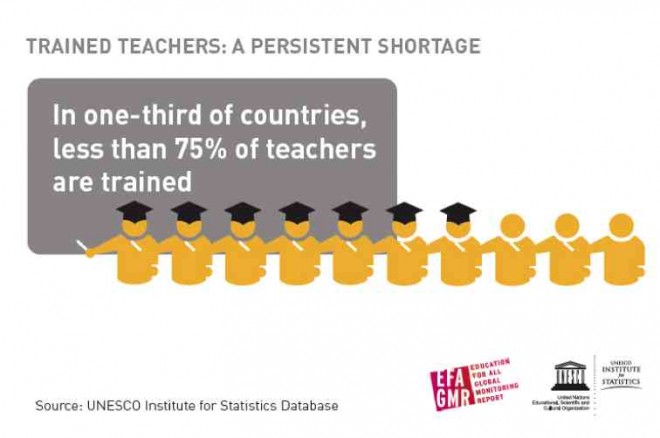World has chronic lack of trained teachers

Education Secretary Armin Luistro honors 7,500 teachers and administrators from Regions VI, VII and VIII in Victorias City, Negros Occidental province, on World Teachers’ Day. Also in attendance are Senate President Franklin Drilon, Mayor Francis Palanca, Rep. Alfredo Benitez, Gov. Alfredo Marañon Jr., Metrobank Foundation president Chito Sobrepeña, Postmaster General Josie dela Cruz, Education Undersecretary Mario Deriquito, Bato Balani Foundation awardees and Metrobank Foundation Outstanding Teachers awardees. JAY TANWANGCO/CONTRIBUTOR
In the rush to fill the chronic, global shortage of teachers, many countries are sacrificing standards and undermining progress by hiring people with little or no training, concludes a new United Nations Educational, Scientific and Cultural Organization (Unesco) policy paper, published on World Teachers’ Day 2014.
Prepared by the Unesco Institute for Statistics (UIS) and the Education for All Global Monitoring Report (EFA GMR), it shows that at least 93 countries have an acute teacher shortage and need to recruit some four million teachers to achieve universal primary education by 2015.
If the deadline is extended to 2030, more than 27 million teachers would need to be hired, 24 million of whom would be required to compensate for natural attrition. At present rates, however, 28 (or 30 percent) of these 93 countries will not meet these needs. Sub-Saharan Africa faces the greatest teacher shortage, accounting for two-thirds of the new teachers needed by 2030. The problem is exacerbated by a steadily growing school-age population.
There are, on average, 19 pupils per teacher in primary school in East Asia. This is well above the target of 40 pupils per teacher.
In the Philippines, the number of pupils per teacher has slightly decreased over the past decade, from 35:1 in 2000 to 31:1 in 2009.
Article continues after this advertisementLike in many other countries of the region, the lack of trained teachers in the Philippines, especially in critical early grades and in disadvantaged areas, remains a problem. More experienced teachers who might be knowledgeable in effective strategies to teach early-grade reading and math are more likely to be assigned to higher rather than lower grades. This is reflected in the very poor performance of students in reading and mathematics in the early grades.
Article continues after this advertisement“A quality universal primary education will remain a distant dream for millions of children living in countries without enough trained teachers in classrooms,” said Irina Bokova, director general of Unesco. “Teachers are the core of any education system. Hiring and training new and already established teachers [are] fundamental to protecting children’s ability to learn in school.”
Under pressure to fill gaps, many countries are recruiting teachers who lack the most basic training. In one-third of countries with data, fewer than
75 percent of primary school teachers were trained according to national standards in 2012.
“Putting well-intentioned instructors in front of huge classrooms and calling them teachers will not deliver our ambitions to have every child in school and learning,” said Aaron Benavot, director of EFA GMR. “We have prepared a new Advocacy Toolkit for teachers to help us relay these messages to their governments. Teachers, better than anyone else, can relay how teacher shortages and lack of training are making it nigh-on impossible to deliver a quality education.”
Countries must ensure that all new teacher candidates have completed at least secondary education. Yet GMR shows that the numbers of those with this qualification in many countries are in short supply.
“The good news is that most countries can afford to hire the extra teachers if they continue to steadily increase investment in education,” said Hendrik van der Pol, director of UIS.
In order to gauge teachers’ opinions on these issues, GMR has launched an online questionnaire for teachers, asking them to assess where policy reforms have made a difference and where there is still room for improvement.
Teachers may access the questionnaire via https://docs.google.com/forms/d/1ZmdEHEiW8vFlGlajfu1HKklM9fy3XZioj_4nkntF3f0/viewform.
